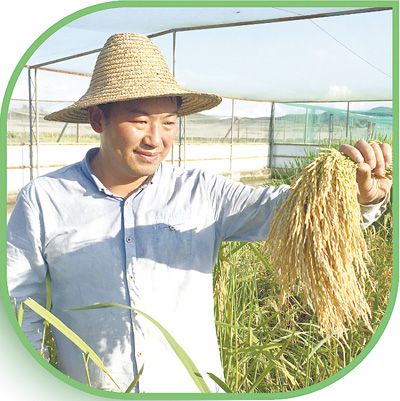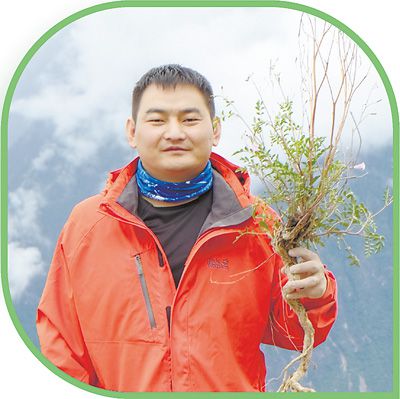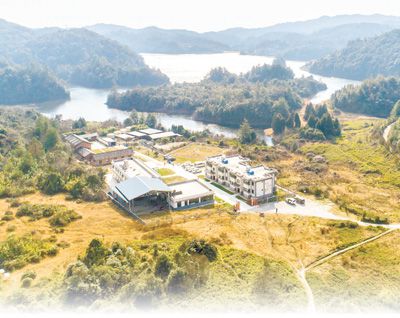The Xishuangbanna Tropical Botanical Garden (XTBG) of the Chinese Academy of Sciences was established in the late 1950s by the late Cai Xitao, a respected botanist, in southwest China’s Yunnan Province. Now, a group of young scientists are carrying forward Cai's scientific spirit.

Xu Peng checks ears of upland rice at a breeding base. (Photo courtesy of the Xishuangbanna Tropical Botanical Garden of the Chinese Academy of Sciences)
Young scientists account for 12 percent of all 279 professionals at XTBG, which is located in Menglun town, Mengla county of Xishuangbanna Dai autonomous prefecture.
Tan Yunhong, head of the plant diversity and conservation research group under XTBG, is one of them. Starting from 2014, Tan would lead his team to carry out scientific expeditions twice a year deep in the mountains of Southeast Asia, each time lasting for about a month on average.
“Cai’s story is the stuff of legend,” said Tan, explaining that trekking in the wild was a daily routine of Cai’s, who previously collected more than 100,000 specimens, helped China search for critically needed rubber tree varieties, and built a first-class botanical garden in the country.

Xing Yaowu, a researcher with the Xishuangbanna Tropical Botanical Garden of the Chinese Academy of Sciences, shows a plant sample he collected in the wild. (Photo courtesy of the Xishuangbanna Tropical Botanical Garden of the Chinese Academy of Sciences)
Tan said Cai’s spirit of exploration encouraged his team to keep going despite the fieldwork they undertook being an arduous task, which requires them to go deep inside the mountains and forests of Southeast Asia, where they face leech bites and tick bites, with the latter potentially causing serious and potentially life-threatening conditions. So far, Tan’s team has discovered over 700 new species.
Cai’s choice to pursue plant research was made not only based on his interest in plants, much like Peng Yanqiong, a forest ecologist with XTBG, who chose insects as her field of research not only out of curiosity but also to address the needs of the country and society.
Over the past years, Peng conducted background surveys on insects and carried out surveys on insect diversity in south China’s Guangxi Zhuang Autonomous Region and Hainan Province. These surveys are all directly related to local agricultural production and farmers’ livelihoods.

Aerial photo shows the Ailaoshan facilities of the Xishuangbanna Tropical Botanical Garden of the Chinese Academy of Sciences. (Photo courtesy of the Xishuangbanna Tropical Botanical Garden of the Chinese Academy of Sciences)
“Our research is aimed at figuring out the laws of forest ecology and finding ways to protect biodiversity so as to provide people with a more harmonious and healthy ecological environment. That’s how we pass on the idea of serving people with botanical knowledge,” Peng said.
Adhering to the botanical garden’s founding purpose of seeking raw materials necessary for economic development, its older generations of researchers have discovered and developed numerous resources for use as food, oil and medicines among ethnic minority groups in Yunnan. What’s more, this tradition has continued down to this day.
Xu Peng, who joined XTBG in 2016, has been engaged in the research, conservation and genetic improvement of tropical rice seeds. Over the past five years, Xu’s team has developed new varieties of upland rice and has promoted the planting of these varieties on over 2 million mu (about 133,333 hectares) of land. The team also promoted the planting of upland rice abroad, sharing China’s successful experience with neighboring countries.

Hu Yanru conducts an experiment inside a laboratory. (Photo courtesy of the Xishuangbanna Tropical Botanical Garden of the Chinese Academy of Sciences)
According to Yang Yongping, director of the botanical garden, inheritance and respect for talents are some of the most fundamental reasons for the garden’s continued success.
Hu Yanru, now in his thirties, is one of the garden's beneficiaries and has served as the director of a key laboratory under XTBG.
“A self-taught botanist, Cai believed that people can become talented through self-study and scientific practices. Appointing talents without being limited to their educational background has become a tradition in the garden,” said Hu.
Hu added that the botanical garden prefers talents with practical learning and emphasizes their scientific achievements instead of educational background, making it a magnet for young talents.
URL: http://en.people.cn/n3/2022/0301/c90000-9964212.html




